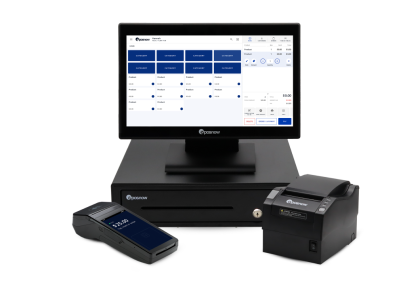How Much Do Car Wash Owners Make?
If you’ve ever thought about starting a car wash and wondered if it would be worthwhile, you’ve come to the right place. We let you know how much car wash owners can expect to earn, industry and market trends, and factors that affect income.
How Much Car Wash Owners Make
With an industry expected to grow by about 4.8% per year through 2028, and a projected market share of $20.74 billion (U.S.) by 2028 [1], car washes may be just the type of business opportunity you’ve been looking for.
Annual car wash income is difficult to estimate because it depends on the type of car wash you own, how much you charge per vehicle, and your recurring expenses. One estimate for in-bay automatic car washes puts the average car wash owner’s annual income at around $86,500 [2].
However, that’s just the estimate for one specific type of car wash and may not accurately reflect your business model or actual income levels.
Factors That Impact Profit
No matter which type of business you choose to own, you’ll run into costs that affect your profits. Some are unique to the car wash industry, while others affect all business types. We break down a few of the most common below.
Location
As with nearly any business type, the location may be one of the most important factors in drawing and retaining customers. Car washes are one of the few businesses that must have a physical location, and where customers must appear in person.
If your location means your car wash isn’t visible from the road, you could be losing out on large chunks of revenue. In fact, in a recent survey conducted by the International Car Wash Association, 75% of customers learned about the car wash they use most frequently because they saw it when they drove by it [3].
If you’ve purchased a pre-existing car wash with a less-than-ideal location, consider adding signage that’s visible from the roadway to catch a potential customer’s eye.
Types of Car Wash
Of course, the type of car wash you own affects how much profit you take home. There are self-serve car washes, automatic car washes, and full-service car washes.
Self-Service
This type of car wash typically requires the least from you financially, since customers are washing their cars themselves using coin- or card-operated wands for rinsing and soaping. Some self-service car washes also allow customers to add a wax coating or polish to the car for an extra fee.
There are usually no dryers, and it’s up to you whether or not you make vacuums available to customers.
Self-serve car washes usually cost the consumer less to use than the other two types, while bringing in the least revenue, on average.
Automatic Car Washes
There are two main types of automated car washes: in-bay and tunnel (or conveyor).
With an in-bay car wash, the car pulls into a bay and remains stationary while it’s being washed. Tunnel car washes pull the car through a tunnel along a conveyor belt or track while it’s being washed.
There are also a variety of ways to automatically wash the car:
- Using brushes
- Not using brushes (brushless, touchless, or no touch)
- Using soft materials and lightly brushing the car (soft-touch)
When the car pulls out of the bay or tunnel, there may or may not be an automated dryer or blower to dry off the car.
Most automatic car washes include vacuums for customers, which may be pay-per-use or free, depending on what you choose to do.
Automatic car washes typically cost the consumer more than a self-serve car wash, but less than a full-service car wash. You typically earn more revenue from an automatic car wash than a self-serve car wash.
The Fully-Loaded Car Wash EPOS
Keep your customers' vehicles on the road and looking sharp with the point of sale that does it all.
- Offer customised pricing plans and menu options
- Manage all inventory in real-time, including liquid cleaning supplies
- Offer a loyalty program to reward repeat washes
- Integrate with third-party apps
- Access your cloud-based system from any device, anywhere

Full-Service Car Washes
A full-service car wash is usually more hands-on than an automatic car wash. The car may be washed by hand, or dried/waxed by hand, or both. Additional services, such as shampooing or vacuuming the interior may be done by employees, as well.
In these types of car washes, customers usually go to a waiting area that may have other amenities, such as coffee, light snacks, entertainment options, and seating while their car is being serviced.
Full-services car washes usually cost more for the consumer than the other types of car washes because you’re providing a higher level of service. You may or may not earn higher revenue because you’ve got to pay additional expenses, like maintaining a customer waiting area and hiring skilled employees.
Mother Nature
Yes, it’s true—Mother Nature can also affect your profits by driving customers away. Often, this is related to your location. For example, car washes located in climates with varying seasons may have seasonal downtimes, which will mean less revenue during those slow times.
There may also be times when storms or acts of nature will keep customers away—including during hurricane season, or in blizzards, floods, wildfires, or earthquakes.
When choosing where to open a car wash, keep these factors in mind. If possible, you’ll want to steer clear of areas that are prone to natural disasters and have a plan in place to handle your area’s slow seasons, such as the rainy season in warmer climates.
Recurring Expenses
There are many weekly, monthly, or yearly recurring expenses you’ll need to factor into your budget, and each of these can erode your profits in different ways. Again, the type of car wash you decide to own will play a role in each of these expense categories. We examine a few of the more typical expenses car wash owners face regularly.
- Employee payroll, taxes, benefits (full-service/automatic car washes only)
- Business taxes
- Supplies (cleaning agents, polishing/waxing agents, brushes, cloths, vacuum hoses, etc.)
- Lease or mortgage (for pad site/building)
- Business loan repayments
- Utilities (water, electricity, gas)
- Equipment repairs/maintenance
- Business insurance
- Signage
- Franchise fees (if applicable)
- Food/beverages for customers (full-service only)
You may also have annual license renewal or permit fees, depending on where your carwash is located. Each of these recurring expenses will come out of your revenue, meaning less profit and less income for you.
Business profit and personal income are often mistaken as the same thing by small business owners, but this isn’t the case.
Profit vs. Income
The question of profit versus income is often a confusing one. Just because your business made a certain amount for the month or year doesn’t mean that’s all your income.
First, you’ll need to pay all of your expenses for the month. Then, anything left over after expenses (including whatever taxes you may owe) can be considered your income (or net profit) for the month. If your monthly expenses vary, then your monthly income will also vary.
Don’t forget to budget for those annual expenses that may only be paid once per year but will also reduce what you can call your income, and of course, any one-time or unexpected expenses, such as repairing a vacuum, or having to replace the building’s roof.
One expense that often gets overlooked is the car wash’s point of sale system.
A Quality POS System
While most of the expenses listed above may seem obvious, many business owners forget about their point of sale system until the business is ready to open. Don’t let a last-minute panic cause you to purchase a lackluster system.
Epos Now offers several secure and powerful point of sale options for business owners and is compatible with popular credit cards (including Visa, MasterCard, and American Express). Not only that, but US News and World Report recently ranked epos now as one of the best POS providers in the United States.
You can rest easy knowing your payment system is taken care of before you welcome customers to your car wash.
